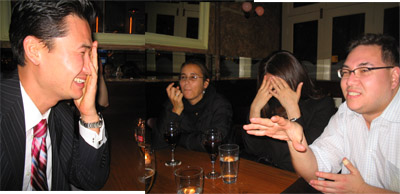|
|
 |
Word of mouth as a marketing tool, as I'm sure you're already aware, isn't some new phenomenon. And I'm sure you're also aware that just because you just caught on to how to utilize it to promote your goods, that it hasn't already been doing that without you. And no, word of mouth wasn't invented by Al Gore, Proctor & Gamble, nor the Pentagon, although all three are masters of the form.
Keeping in mind that any marketing effort plays a fractional role in your consumer's decision-marking process, it's highly suspect that the average Joe would be particularly offended by how you go about marketing to him. Besides, being offended means your morals or principles have been aggrieved. Taking action means you'd have to change your behavior and it takes a not too insubstantial amount of will power to change behavior to accommodate principles; if a consumer needs a product, it's highly unlikely they'll forgo the optimal option because they're offended at your marketing of that product. A mid-Westerner earning under $25,000 per year won't shop Wholefoods over Wal-Mart, no matter what they've heard about Wal-Mart.
Based on a recent analysis by al berrios & co. of a word of mouth marketing effort tracked online for a cable television network client, where in one sample group, paid endorsers did not reveal they were paid endorsers and in another sample group, paid endorsers did reveal they were paid endorsers, we learned that when not disclosing identity, our client achieved their marketing objectives without any impact to their brand, while the group that knew they were being marketed to by paid endorsers completely cut off the paid endorsers.
OK, but what if they found out on their own that they were being marketed to by a paid endorser? When a target sub-group of theatre-goers did take it upon themselves to address their own suspicions that a paid endorser was paid to promote to them, just under 10% of those fans reacted vehemently against the paid endorser, while the rest of the interacting target group continued to have positive interactions with our paid endorsers.
In prior analyses, we've found similar results and lower. On average, well under 2% of any target group will react negatively to being promoted to via word of mouth. Even when most people learn they're being marketed to, and after the novelty wears off, the interaction continues positively, frankly apathetic to the fact that they're interacting with someone paid to interact with them. In many instances, our paid endorsers were even thanked for offering the information they offered about our client's programming; not unlike the way one feels about having access to someone "on the inside". What stronger evidence exists that points to how much word of mouth is appreciated by the average Joe than the mere fact that social networking, a natural form of human interaction, has evolved into a business model on the internet from which companies can profit from?
Is the fabric of society really detrimentally impacted by word of mouth marketing? The real question should be whether or not commercialization itself has detrimentally impacted social relations. If it's on sale, it's worth talking about, whether or not we're paid or unpaid endorsers. Why? Because as human beings we aspire to possess nice, shiny things. Thus, for consumer groups to protest a natural human act begs the question: how dysfunctional is their perception of natural human interaction? Based on the demographics of our sampled groups, the issue seems to be strictly a generational one.
But isn't it unethical to lie to your consumer, lying because by using word of mouth, we're not implying or revealing critical information they may need to honestly evaluate our brand? A better question would be whether or not the onus is on the marketer or the consumer to fully inform the consumer? In other words, who's responsibility is consumer ignorance? And who defines and classifies the nature of the information distributed by companies via any form of media in a free market system if not the companies themselves? In the U.S., it's the Federal Communications Committee (FCC).
Well, if the FCC can define what is decent on the airwaves and the appropriate age for young people to be marketed to online (13 years old, by the way), then it's not too far-fetched that it's on their agenda to set policy for what marketers say to consumers via other consumers as intermediaries, a tricky topic indeed when such a fine line exists between genuine interest and paid interest, and, oh yea, there's no real media involved. And if this policy is set and enforced, and the courts do figure out a way to distinguish paid and unpaid endorsement so they can fine the payer of said endorsement for violating the law, then the payer will merely find a way to get the endorser to endorse either a) without ever revealing that they're the one influencing the endorser's endorsements or b) offer 100% transparency and shift liability to endorser, creating a ridiculous legal conundrum. (Other, more aggressive marketers will simply account for these penalties as part of their regular marketing budgets, because if word of mouth works, and the results outweigh the punishment, then it'll continue.)
My last question would
then be how long until we end up in a society where we can sue those aggressive
recruiters of religious faiths, or perhaps those recruiters for the armed forces,
or even anyone who would dare to casually inform me that the latest movie was
"cool"?
|
|